The Boiler Water Treatment Chemicals Market is estimated to be valued at USD 190.0 million in 2025 and is projected to reach USD 511.5 million by 2035, registering a compound annual growth rate (CAGR) of 10.4% over the forecast period.
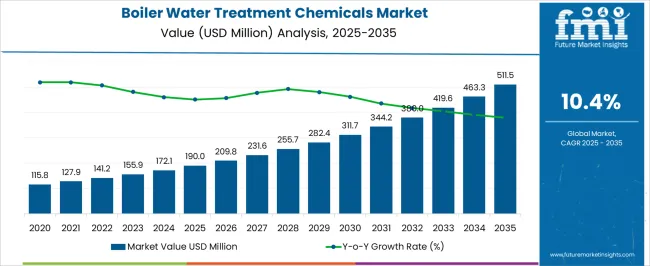
| Metric | Value |
|---|---|
| Boiler Water Treatment Chemicals Market Estimated Value in (2025 E) | USD 190.0 million |
| Boiler Water Treatment Chemicals Market Forecast Value in (2035 F) | USD 511.5 million |
| Forecast CAGR (2025 to 2035) | 10.4% |
The Boiler Water Treatment Chemicals market is gaining momentum due to the rising demand for energy efficiency, equipment longevity, and regulatory compliance in industrial and commercial facilities. Boilers are widely used in manufacturing, power generation, and process industries, and their performance heavily depends on water quality. Untreated water leads to scale formation, corrosion, and microbial contamination, which can cause significant operational downtime and costly repairs.
Boiler water treatment chemicals play a pivotal role in addressing these challenges by improving heat transfer efficiency, reducing energy consumption, and minimizing the risk of equipment failure. Increasing industrialization, coupled with growing energy consumption worldwide, is driving the need for advanced water treatment solutions. Furthermore, stringent environmental and safety regulations are compelling industries to adopt effective chemical treatment methods to ensure compliance and reduce emissions.
Innovation in chemical formulations, including eco-friendly and high-performance products, is also shaping the market With the rising emphasis on sustainability and cost optimization, the demand for boiler water treatment chemicals is expected to grow steadily across both developed and emerging markets.
The boiler water treatment chemicals market is segmented by chemical type, application, and geographic regions. By chemical type, boiler water treatment chemicals market is divided into Corrosion & Scale Inhibitors, Molybdates, Phosphates, Phosphonates, Other Corrosion & Scale Inhibitors, Biocides, Chlorine And Chlorine Derivatives, Bromine Derivatives, Other Biocides, Coagulants & Flocculants, Metallic Salts, Polymers, Other Coagulants & Flocculants, Ph Control Agents, Bases, Acids, Foam Control Agents, Oxygen Scavengers, Other Boiler Water Treatment Chemicals, Fluoridation Chemicals, Chelating Agents, and All Other Water Treatment Chemicals. In terms of application, boiler water treatment chemicals market is classified into Industrial, Chemical Industries, Food & Beverage, Pulp & Paper, Oil Refineries And Petrochemical, Power Sector (Power Plants), Textile And Construction, Steel & Metal, Equipment Manufacturing, Automobile & Aerospace, Others (Sugar Mills, Pharmaceuticals Etc.), Commercials, Institutes And Educational Facilities, Public Facilities (Airports, Railways), and Others (Hotels & Restaurants). Regionally, the boiler water treatment chemicals industry is classified into North America, Latin America, Western Europe, Eastern Europe, Balkan & Baltic Countries, Russia & Belarus, Central Asia, East Asia, South Asia & Pacific, and the Middle East & Africa.
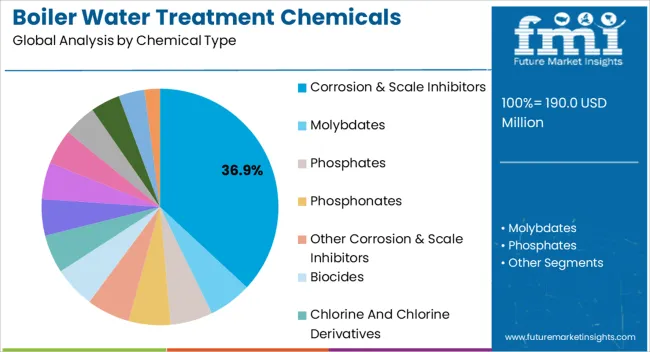
The corrosion and scale inhibitors segment is projected to hold 36.9% of the Boiler Water Treatment Chemicals market revenue share in 2025, positioning it as the leading chemical type. This dominance is attributed to the critical role these inhibitors play in preventing scale deposits and corrosion, which are primary causes of reduced boiler efficiency and failures. By forming protective layers and regulating water chemistry, these chemicals enhance equipment durability and operational safety.
The ability to minimize maintenance costs, extend boiler lifespan, and optimize energy use is reinforcing their preference across industries. Industries such as power generation, petrochemicals, and manufacturing are increasingly deploying corrosion and scale inhibitors due to their reliability and cost-effectiveness.
Continuous advancements in formulations to enhance efficiency under varying pressure and temperature conditions are further supporting segment growth As industries face stricter environmental regulations and rising fuel costs, the demand for effective corrosion and scale control solutions is expected to remain strong, securing the segment’s leadership in the market.
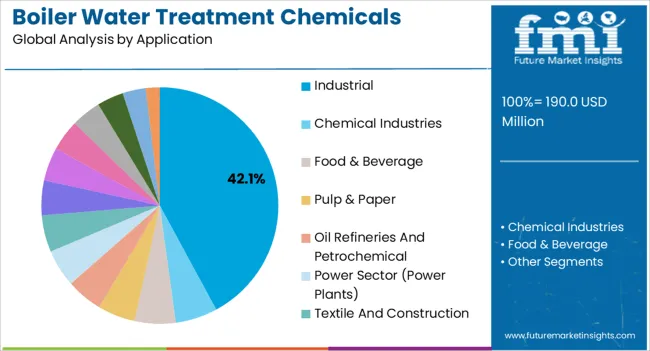
The industrial application segment is anticipated to account for 42.1% of the Boiler Water Treatment Chemicals market revenue share in 2025, establishing it as the largest application area. Industrial sectors such as power plants, chemical processing, oil and gas, and food and beverage rely heavily on boilers for steam generation, process heating, and energy production. The efficiency and reliability of these operations are directly influenced by boiler water quality, making treatment chemicals indispensable.
Adoption is being driven by the growing demand for uninterrupted operations, cost control, and compliance with environmental and safety standards. Industrial facilities are increasingly opting for advanced treatment programs that combine corrosion inhibitors, scale preventers, and oxygen scavengers to ensure long-term efficiency.
The use of treatment chemicals not only reduces equipment downtime but also improves fuel efficiency by maintaining optimal heat transfer conditions With rising global industrial output and increased investment in energy-intensive sectors, demand for boiler water treatment chemicals in industrial applications is expected to maintain its dominance, reinforced by sustainability-focused innovations and growing operational requirements.
A single day’s loss of steam production in an operational unit can cost manufacturing companies much more than the total expenses bore by companies, in the maintenance of their boilers during a span of one or two years. Boiler water treatment is essential - boiler systems require effective chemical treatment with accurate monitoring and control.
A badly serviced steam boiler is like a potential bomb. This is precisely why getting good quality feed water and maintaining properties of boiler water correct, are of much importance. In order to understand the requirement of the feed water supplied to a particular steam boiler, a basic and simple study of its supply/feed water must be done thoroughly.
Feed water usually contains dissolved solids, dissolved gases, and suspended solids. These impurities are capable of causing severe damages to the boiler and its parts. In order to keep the boiler working effectively, treatment of feed water is essential as well as highly recommended.
It is typically more cost effective and economical to address the impurities by mechanical or physical means. Chemical treatment is done only to clean remaining parts and traces of impurities after the physical treatment is over. However, it is very essential to use chemical treatments for feed water as the impurities can damage boiler parts and accessories.
With increasing use of boiler water treatment chemicals, their demand is estimated to grow significantly in across various end-use industries over the forecast period.
These chemicals reduce the corrosion of boiler vessels and pipelines, leading to considerable increase in the equipment life. Moreover, the addition of these chemicals to the boiler water feed increases its fluidity and hence, the flow is maintained and thus, the boiler efficiency is increased.
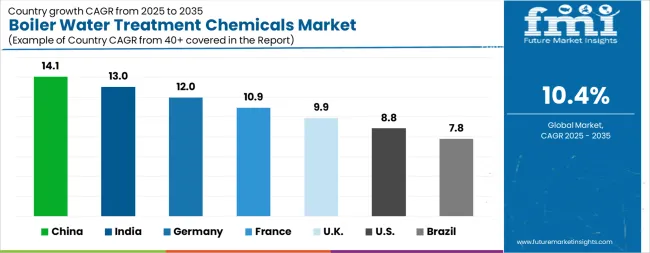
| Country | CAGR |
|---|---|
| China | 14.1% |
| India | 13.0% |
| Germany | 12.0% |
| France | 10.9% |
| UK | 9.9% |
| USA | 8.8% |
| Brazil | 7.8% |
The Boiler Water Treatment Chemicals Market is expected to register a CAGR of 10.4% during the forecast period, exhibiting varied country level momentum. China leads with the highest CAGR of 14.1%, followed by India at 13.0%. Developed markets such as Germany, France, and the UK continue to expand steadily, while the USA is likely to grow at consistent rates. Brazil posts the lowest CAGR at 7.8%, yet still underscores a broadly positive trajectory for the global Boiler Water Treatment Chemicals Market. In 2024, Germany held a dominant revenue in the Western Europe market and is expected to grow with a CAGR of 12.0%. The USA Boiler Water Treatment Chemicals Market is estimated to be valued at USD 66.0 million in 2025 and is anticipated to reach a valuation of USD 154.1 million by 2035. Sales are projected to rise at a CAGR of 8.8% over the forecast period between 2025 and 2035. While Japan and South Korea markets are estimated to be valued at USD 10.2 million and USD 5.9 million respectively in 2025.
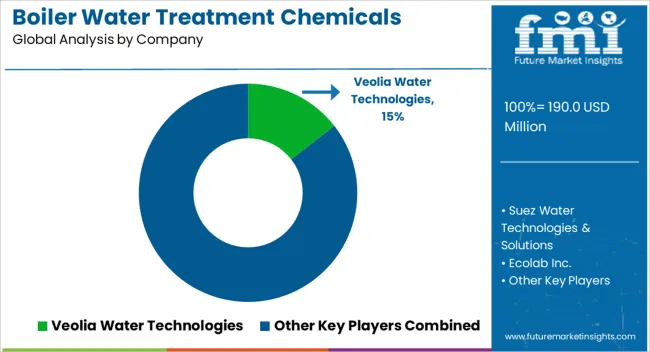
| Item | Value |
|---|---|
| Quantitative Units | USD 190.0 Million |
| Chemical Type | Corrosion & Scale Inhibitors, Molybdates, Phosphates, Phosphonates, Other Corrosion & Scale Inhibitors, Biocides, Chlorine And Chlorine Derivatives, Bromine Derivatives, Other Biocides, Coagulants & Flocculants, Metallic Salts, Polymers, Other Coagulants & Flocculants, Ph Control Agents, Bases, Acids, Foam Control Agents, Oxygen Scavengers, Other Boiler Water Treatment Chemicals, Fluoridation Chemicals, Chelating Agents, and All Other Water Treatment Chemicals |
| Application | Industrial, Chemical Industries, Food & Beverage, Pulp & Paper, Oil Refineries And Petrochemical, Power Sector (Power Plants), Textile And Construction, Steel & Metal, Equipment Manufacturing, Automobile & Aerospace, Others (Sugar Mills, Pharmaceuticals Etc.), Commercials, Institutes And Educational Facilities, Public Facilities (Airports, Railways), and Others (Hotels & Restaurants) |
| Regions Covered | North America, Europe, Asia-Pacific, Latin America, Middle East & Africa |
| Country Covered | United States, Canada, Germany, France, United Kingdom, China, Japan, India, Brazil, South Africa |
| Key Companies Profiled | Veolia Water Technologies, Suez Water Technologies & Solutions, Ecolab Inc., Kurita Water Industries Ltd., ChemTreat, Inc. (a subsidiary of Danaher Corporation), Nalco Water (an Ecolab Company), GE Water & Process Technologies (now part of SUEZ), Solenis LLC, AkzoNobel N.V., BASF SE, Dow Chemical Company, Accepta, Kemira Oyj, and SNF Group |
The global boiler water treatment chemicals market is estimated to be valued at USD 190.0 million in 2025.
The market size for the boiler water treatment chemicals market is projected to reach USD 511.5 million by 2035.
The boiler water treatment chemicals market is expected to grow at a 10.4% CAGR between 2025 and 2035.
The key product types in boiler water treatment chemicals market are corrosion & scale inhibitors, molybdates, phosphates, phosphonates, other corrosion & scale inhibitors, biocides, chlorine and chlorine derivatives, bromine derivatives, other biocides, coagulants & flocculants, metallic salts, polymers, other coagulants & flocculants, ph control agents, bases, acids, foam control agents, oxygen scavengers, other boiler water treatment chemicals, fluoridation chemicals, chelating agents and all other water treatment chemicals.
In terms of application, industrial segment to command 42.1% share in the boiler water treatment chemicals market in 2025.






Our Research Products

The "Full Research Suite" delivers actionable market intel, deep dives on markets or technologies, so clients act faster, cut risk, and unlock growth.

The Leaderboard benchmarks and ranks top vendors, classifying them as Established Leaders, Leading Challengers, or Disruptors & Challengers.

Locates where complements amplify value and substitutes erode it, forecasting net impact by horizon

We deliver granular, decision-grade intel: market sizing, 5-year forecasts, pricing, adoption, usage, revenue, and operational KPIs—plus competitor tracking, regulation, and value chains—across 60 countries broadly.

Spot the shifts before they hit your P&L. We track inflection points, adoption curves, pricing moves, and ecosystem plays to show where demand is heading, why it is changing, and what to do next across high-growth markets and disruptive tech

Real-time reads of user behavior. We track shifting priorities, perceptions of today’s and next-gen services, and provider experience, then pace how fast tech moves from trial to adoption, blending buyer, consumer, and channel inputs with social signals (#WhySwitch, #UX).

Partner with our analyst team to build a custom report designed around your business priorities. From analysing market trends to assessing competitors or crafting bespoke datasets, we tailor insights to your needs.
Supplier Intelligence
Discovery & Profiling
Capacity & Footprint
Performance & Risk
Compliance & Governance
Commercial Readiness
Who Supplies Whom
Scorecards & Shortlists
Playbooks & Docs
Category Intelligence
Definition & Scope
Demand & Use Cases
Cost Drivers
Market Structure
Supply Chain Map
Trade & Policy
Operating Norms
Deliverables
Buyer Intelligence
Account Basics
Spend & Scope
Procurement Model
Vendor Requirements
Terms & Policies
Entry Strategy
Pain Points & Triggers
Outputs
Pricing Analysis
Benchmarks
Trends
Should-Cost
Indexation
Landed Cost
Commercial Terms
Deliverables
Brand Analysis
Positioning & Value Prop
Share & Presence
Customer Evidence
Go-to-Market
Digital & Reputation
Compliance & Trust
KPIs & Gaps
Outputs
Full Research Suite comprises of:
Market outlook & trends analysis
Interviews & case studies
Strategic recommendations
Vendor profiles & capabilities analysis
5-year forecasts
8 regions and 60+ country-level data splits
Market segment data splits
12 months of continuous data updates
DELIVERED AS:
PDF EXCEL ONLINE
Cooling Water Treatment Chemicals Market Growth - Trends & Forecast 2025 to 2035
Water Treatment System Market Size and Share Forecast Outlook 2025 to 2035
Water Treatment Chemical Market Size and Share Forecast Outlook 2025 to 2035
Water Treatment Market Size and Share Forecast Outlook 2025 to 2035
Water Treatment Ozone Generator Market Size and Share Forecast Outlook 2025 to 2035
Water Treatment Equipment Market Size and Share Forecast Outlook 2025 to 2035
Water Treatment Polymers Market Growth & Demand 2025 to 2035
Wastewater Treatment Aerators Market Size and Share Forecast Outlook 2025 to 2035
Soil Treatment Chemicals Market
Water and Wastewater Treatment Equipment Market Size and Share Forecast Outlook 2025 to 2035
Water and Waste Water Treatment Chemical Market Size and Share Forecast Outlook 2025 to 2035
Sterile Water Treatment System Market Size and Share Forecast Outlook 2025 to 2035
Ballast Water Treatment System Market
Produced Water Treatment System Market Size and Share Forecast Outlook 2025 to 2035
Sludge Treatment Chemicals Market Growth - Trends & Forecast 2025 to 2035
Aquarium Water Treatment Market Growth - Trends & Forecast 2025 to 2035
Surface Treatment Chemicals Market Size and Share Forecast Outlook 2025 to 2035
Water Tube Food Processing Boiler Market Size and Share Forecast Outlook 2025 to 2035
Demand for Water Treatment System in Japan Size and Share Forecast Outlook 2025 to 2035
Demand for Water Treatment System in USA Size and Share Forecast Outlook 2025 to 2035

Thank you!
You will receive an email from our Business Development Manager. Please be sure to check your SPAM/JUNK folder too.
Chat With
MaRIA